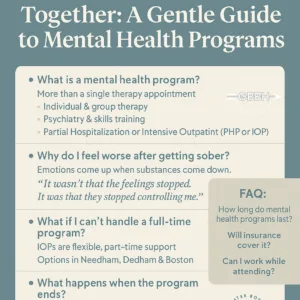Even when you’re doing the “right” things—showing up to group, staying sober, trying to take care of yourself—it can feel like you’re moving through molasses. Like everyone else got the rulebook and you’re just winging it. That ache of loneliness, of wondering “Why am I still struggling?”—you’re not imagining it.
Mental health programs don’t promise instant peace. But they do offer a place to feel seen, a structure to steady your days, and people who won’t flinch when you tell the truth.
At Greater Boston Behavioral Health, our mental health programs in Boston, MA are designed to meet people in this messy, in-between place. Below, we’ll walk through what these programs offer and answer some questions you might be too tired—or too unsure—to ask out loud.
What is a Mental Health Program?
A mental health program is more than a single therapy appointment. It’s a coordinated, team-based approach to emotional healing. This might include:
- Individual therapy
- Group therapy
- Psychiatry (for evaluation and medication support)
- Skills training (like DBT or mindfulness)
- Trauma-informed care
Rather than just focusing on one symptom or diagnosis, these programs look at your whole picture—your routines, emotions, triggers, and relationships.
At Greater Boston Behavioral Health, we offer both Partial Hospitalization Programs (PHP) and Intensive Outpatient Programs (IOP) for mental health. Both provide a structured path toward stability without requiring overnight stays.
Why Do I Feel Worse After Getting Sober?
It’s one of the hardest parts no one prepares you for. When the substances are gone, what’s left is the emotion you haven’t had to feel in a long time. Anxiety, sadness, shame, anger, grief—they all come up. And they come up hard.
But this isn’t a sign you’re failing. It’s a sign you’re healing.
Mental health programs can provide tools to hold those emotions without being swept away by them. Through group processing, one-on-one support, and coping skill development, you start learning how to feel without falling apart.
One client shared,
“It wasn’t that the feelings stopped. It was that they stopped controlling me.”
— Outpatient Client, 2023
What If I Can’t Handle a Full-Time Program?
You’re allowed to have limits. Many mental health programs are designed to fit real-life needs. If a full-day PHP feels like too much, you might consider an IOP, which usually runs 3–4 hours a day, a few days a week.
This lets you balance care with other responsibilities—like part-time work, parenting, or rest. If you’re in the Boston area and need options closer to home, programs in Needham or Dedham may also be within reach.
Is Group Therapy as Awkward as It Sounds?
At first, yes. It can feel strange to talk about painful things in front of strangers. But awkward doesn’t mean bad. Most people find that once they hear someone else speak a truth they’ve been holding inside, something shifts.
That moment of “Oh… me too” is powerful. It’s the beginning of connection. And for people feeling lost in early recovery, connection is as vital as oxygen.
What If I’ve Tried Therapy and It Didn’t Help?
That’s a fair concern. Not every therapist—or program—will be the right fit. But that doesn’t mean healing is off the table.
Mental health programs offer a layered approach. They don’t rely on one person or one method. You have a team, a rhythm, and more points of connection. For some, it’s the difference between treading water and learning to swim.
If you’ve been disillusioned before, you’re not alone. We build our programs in Boston on respect, consistency, and collaboration—because you deserve more than being told to “just keep trying.”
What Happens When the Program Ends?
You won’t be dropped. A good mental health program includes what’s often called a step-down plan—a customized next chapter that might include:
- Weekly therapy with a trusted provider
- Psychiatric follow-up if you’re on medication
- Referrals to community groups or alumni support
- Return-to-care options if things get shaky
It’s not about fixing you and sending you off. It’s about building something with you that can last longer than a discharge date.
How Do I Know If I’m Ready?
You don’t have to feel ready. You just have to feel curious enough to wonder if something might help.
People often wait for things to get “bad enough” before they reach out. But if you’re already feeling lonely, unstable, or unsure how to keep going—even while sober—that’s reason enough.
FAQ: Common Questions About Mental Health Programs
How long do mental health programs last?
Programs vary. A typical Intensive Outpatient Program (IOP) may last 6–8 weeks, while a Partial Hospitalization Program (PHP) may be shorter or longer depending on your needs. Your treatment team will adjust the timeline as you go.
Will my insurance cover it?
Most commercial insurance plans do cover mental health programs, especially if a clinical evaluation supports the need. Our team can help you verify coverage and explain your options in plain language.
Can I work or go to school while attending?
Yes—especially with IOP. Many programs offer morning or evening sessions to accommodate your schedule. It’s not always easy, but it is doable, and we’ll help you make a plan that honors both your healing and your real life.
Do I need a diagnosis to start?
Not necessarily. We’ll begin with an assessment to understand what you’re experiencing. Whether or not you already have a diagnosis, our goal is to build a plan that supports your mental health in a way that makes sense for you.
What if I’m afraid to get close to people?
It’s okay to be guarded. You don’t have to be open on Day 1. Most people take time to trust. We don’t rush that. What matters is that you show up—even quietly. That’s how healing begins.
Feeling the weight of it all?
Call (888) 450-3097 or visit to learn more about our mental health programs services in Boston, Massachusetts.


